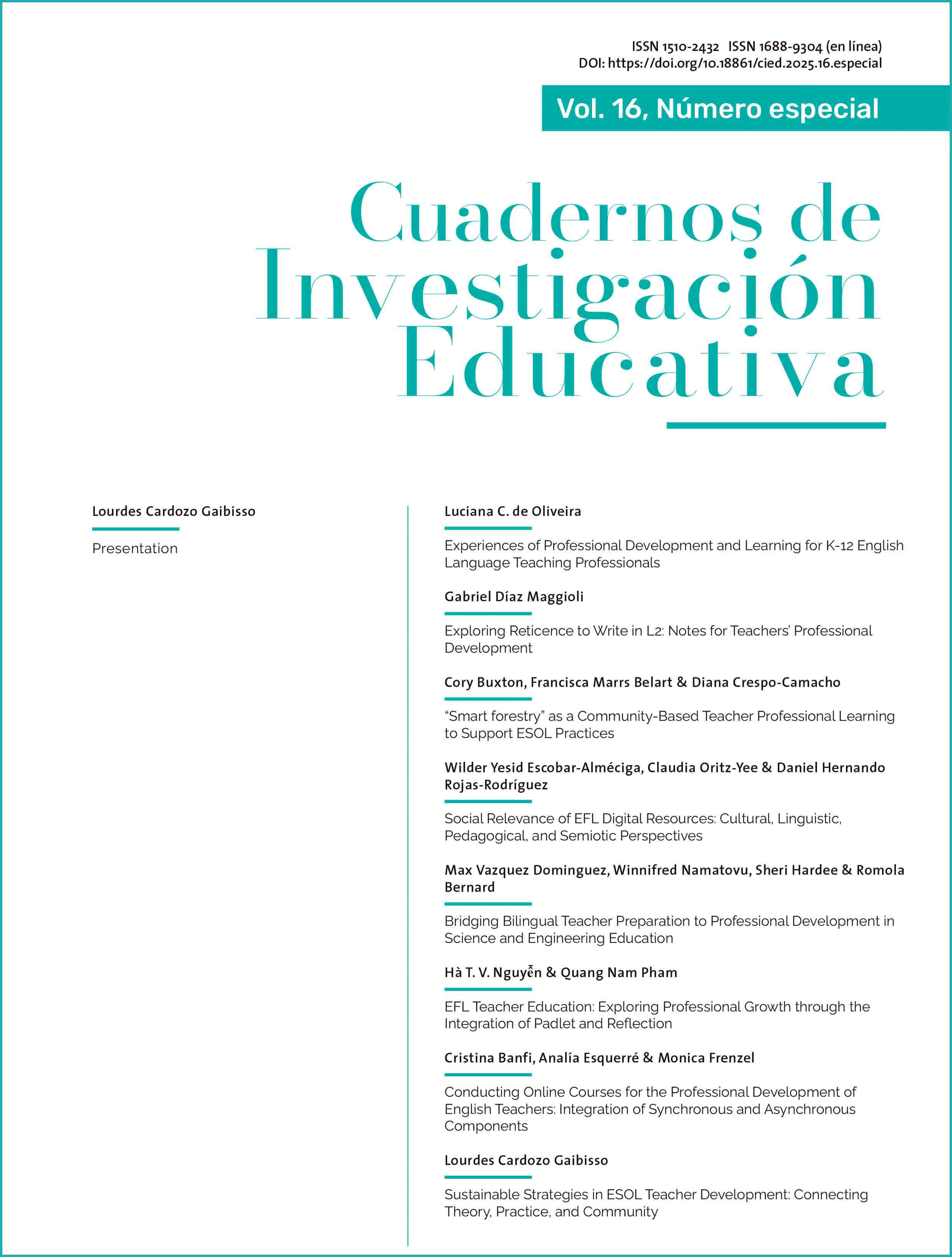Ministrando cursos online para o desenvolvimento profissional de professores de inglês
integração de componentes síncronos e assíncronos
DOI:
https://doi.org/10.18861/cied.2025.16.especial.4065Palavras-chave:
cursos online, desenvolvimento profissional, síncrono, assíncrono, formação docente, competências pedagógicasResumo
O design e a implementação de cursos de formação para professores de inglês exigem um planejamento estratégico cuidadoso para integrar de forma eficaz os componentes síncronos e assíncronos. Esses cursos desempenham um papel fundamental no fomento do desenvolvimento profissional significativo, atendendo às necessidades específicas dos educadores e de seus contextos educacionais. Este artigo examina as considerações essenciais para criar um ambiente de aprendizagem online que apoie tanto a compreensão teórica quanto a aplicação prática. São discutidos aspectos-chave, como o alinhamento dos objetivos de aprendizagem com atividades interativas e envolventes, o uso de ferramentas tecnológicas acessíveis e amigáveis, e a criação de espaços que promovam reflexão, colaboração e troca de conhecimentos entre os participantes. A integração de sessões síncronas permite interações em tempo real, promovendo um senso de comunidade e imediatismo, enquanto os componentes assíncronos oferecem flexibilidade e oportunidades para aprendizado no próprio ritmo. Juntos, esses elementos garantem uma abordagem equilibrada para o desenvolvimento docente. O artigo também destaca estratégias para conectar teoria e prática, garantindo que os educadores possam aplicar o conteúdo do curso em cenários reais de sala de aula. Essas estratégias incluem o uso de estudos de caso, tarefas baseadas em projetos e exercícios de reflexão adaptados aos desafios da prática docente. A conclusão enfatiza a importância de projetar experiências de aprendizagem cultural e linguisticamente inclusivas que não apenas fortaleçam as competências pedagógicas e linguísticas dos professores, mas também aprimorem sua capacidade de criar oportunidades reais de aprendizagem de idiomas para os alunos. Ao priorizar abordagens sustentáveis e sensíveis ao contexto, esses cursos podem contribuir significativamente para a melhoria dos resultados no ensino de idiomas.
Downloads
Referências
Akiba, M., & Liang, G. (2016). Effects of teacher professional learning activities on student achievement growth. The Journal of Educational Research, 109(1), 99–110. https://doi.org/10.1080/00220671.2014.924470
Antoniou, P., & Kyriakides, L. (2013). A dynamic integrated approach to teacher professional development: Impact and sustainability of the effects on improving teacher behavior and student outcomes. Teaching and Teacher Education, 29, 1–12. https://doi.org/10.1016/j.tate.2012.08.001
Casteel, C. J., & Ballantyne, K. G. (Eds.). (2010). Professional development in action: Improving teaching for English learners. National Clearinghouse for English Language Acquisition (NCELA).
Darling-Hammond, L. (1999). Teacher Quality and Student Achievement. A Review of State Policy Evidence. Education Policy Analysis Archives, 8, 1-44. https://doi.org/10.14507/epaa.v8n1.2000
Darling-Hammond, L., Hyler, M. E., & Gardner, M. (2017). Effective Teacher Professional Development. Learning Policy Institute.
de Jong, E. J., & Harper, C. A. (2005). Preparing mainstream teachers for English-language learners: Is being a good teacher good enough? Teacher Education Quarterly, 32(2), 101–124.
Dede, C., Ketelhut, D. J., Whitehouse, P., Breit, L., & McCloskey, E. M. (2009). A research agenda for online teacher professional development. Journal of Teacher Education, 60(1), 8–19. https://doi.org/10.1177/0022487108327554
Dwomoh, R., Osei-Tutu, A., Chhikara, A., Zhuo, L., Oudghiri, S. & Bell, T. (2022). Critical Understanding of English Learners: Experience and Practice of Educators in a Professional Development Course. TESOL Quarterly, 57(4), 1401-1433. https://doi.org/10.1002/tesq.3200
Flint, A., & Jaggers, W. (2021). You matter here: The impact of asset-based pedagogies of learning. Theory Into Practice, 60(3), 254–264. https://doi.org/10.1080/00405841.2021.1911483
Hennissen, P., Beckers, H., & Moerkerke, G. (2017). Linking practice to theory in teacher education: A growth in cognitive structures. Teaching and Teacher Education, 63, 314–325. https://doi.org/10.1016/j.tate.2017.01.008
Irby, B. J., Guerrero, C., Lara-Alecio, R., Tong, F., & Rodriguez, L. (2012). Professional Development Principles for Teachers of English Language Learners. School Leadership Review, 7(1).
Iswati, L. (2023) A Systematic Review of CoP in Informal Learning Communities of English Teachers and Learners. Journal of English Language and Education, 10(3), 1-8. https://doi.org/10.31004/jele.v10i3.790
Guskey, T. R. (2002). Does it Make a Difference? Evaluating Professional Development. Educational Leadership, 59(6), 45-51.
Lave, J., & Wenger, E. (1991). Situated learning: legitimate peripheral participation. Cambridge University Press.
Owston, R., York, D., & Murtha, S. (2013). Student perceptions and achievement in a university blended learning strategic initiative. The Internet and Higher Education, 18, 38-46. https://doi.org/10.1016/j.iheduc.2012.12.003
Richards, J. C. (2010). Competence and performance in language teaching. RELC Journal, 41(2). https://doi.org/10.1177/0033688210372953
Schwartzman, G., Tarasow, F., & Trech M. (Eds.). (2019). De la educación a distancia a la educación en línea. Aportes a un campo en construcción. Homo Sapiens Ediciones; Flacso Argentina.
Shaha, S. H., & Ellsworth, H. (2013). Predictors of success for professional development: Linking student achievement to school and educator successes through on-demand, online professional learning. Journal of Instructional Psychology, 40(1), 19–26.
Van Schaik, P., Volman, M., Admiraal, W., & Schenke, W. (2019). Approaches to co-construction of knowledge in teacher learning groups. Teaching and Teacher Education, 84, 30-43. https://doi.org/10.1016/j.tate.2019.04.019
Wenger, E., McDermott, R., & Snyder, W. (2002). Cultivating communities of practice. Harvard Business School Press.
Wenger, E. T. I. (1998). Communities of Practice: Learning, Meaning, and Identity. Cambridge University Press.
Downloads
Publicado
Como Citar
Edição
Seção
Licença

Este trabalho está licenciado sob uma licença Creative Commons Attribution 4.0 International License.





